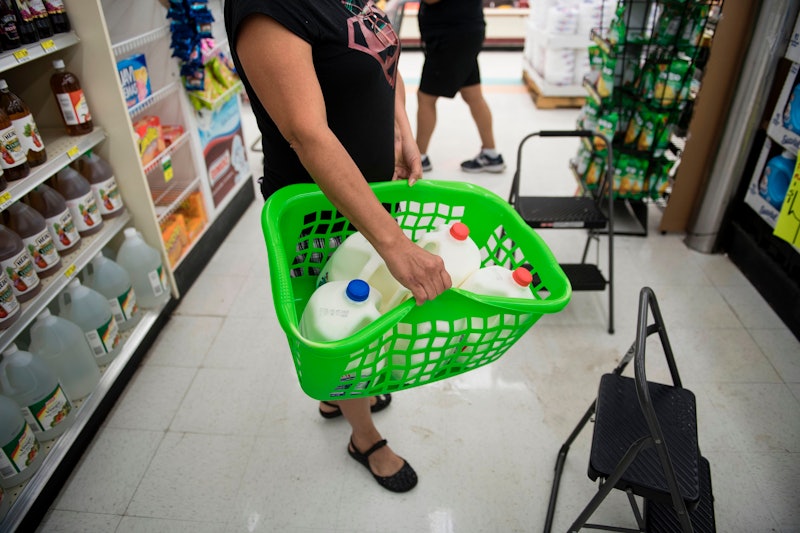News
Stop Calling People "Looters" For Trying To Stay Alive After Hurricane Harvey

Even before Harvey redirected its attention from Texas to Louisiana, reports of "looting" had surfaced. On Tuesday, ABC News journalist Tom Llamas was roundly criticized on social media after he tweeted that he informed police of people "looting" from a Houston supermarket. As Harvey's devastation on the city and its residents piled on, Llamas' tweet sparked intense backlash over a familiar issue: People should not be accused of a crime when they're merely trying to obtain food and survive in the wake of a natural disaster.
In 2005, looting became an intense topic of debate after Hurricane Katrina. It became clear that the term "looting" was often used to describe the actions of black people in New Orleans, whereas media outlets generally avoided its use when white people were involved.
Take the Associated Press, for example. In its reporting on Hurricane Katrina, AP published a photo of a young black man holding a bag as he waded through some water, and the caption said that he had been "looting a grocery store" in New Orleans. At around the same time, the Los Angeles Times reported that Getty Images published a similar photo of a white couple, but the caption described them as "finding" bread and soda.
In addition to categorically having racist implications, what the term "looting" does is to criminalize acts of survival. Llamas' tweets were problematic for a number of reasons, including diverting emergency resources away from people who needed rescuing. But the biggest issue was his apparent lack of compassion: He prioritized calling the police on people who were likely trying to find food in a desperate time of survival.
Narratives about "looting" following a natural disaster frequently descend into myths about people looting TVs and other valuables, but when a disaster like Katrina, Harvey, or Typhoon Haiyan in the Philippines strikes, more often than not, survivors are desperately seeking the resources they need to stay alive.
Myths and sensational stories about looting in the wake of a natural disaster frequently tend to be both racist and classist, because they criminalize poverty and survival while feeding racially charged narratives. In the case of Harvey, the city of Houston is already threatening alleged "looters" with mandatory jail time — and Llamas would appear to be encouraging that.
It is entirely possible that some people are using storm conditions as a cover to take advantage of others fleeing the floods. Indeed, Houston Police Chief Art Acevedo said that his officers had arrested 14 people since Sunday on those grounds. However, most people that Llamas implicated in his claims about looting are likely only looking for whatever they can to survive.
It is worth repeating an idea that was amplified in the national discourse following Michael Brown's fatal shooting by the police in Ferguson: No private property is worth more than somebody's life. The Society of Professional Journalists makes it clear that journalists should "show compassion for those who may be affected adversely by news coverage." It is time that journalists like Llamas — and everybody else watching the tragedy unfold in Texas and Louisiana — took that advice.